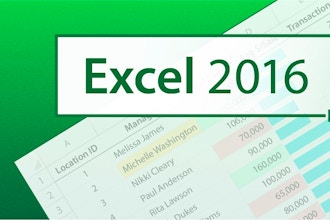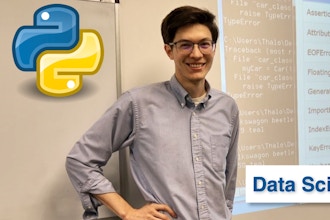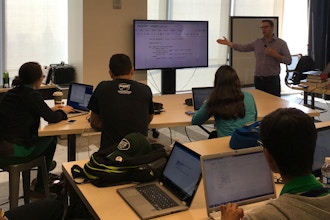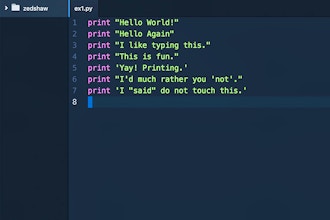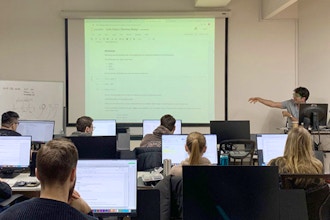Discover the Best Live Online Data Science Classes
Now is an excellent time to study data science. Because more data continues to be created than ever before, data science is currently an in-demand profession. Over the next few years, an increase of more than 20% is expected each year in data generation. This means that data professionals will continue to be in demand across professions and industries for years. Individuals who have data science training are compensated well for their work. These professionals typically make a six-figure income regardless of where they are employed. They also have a high earning potential and a range of job opportunities in sectors like healthcare, government, pharmaceuticals, manufacturing, telecommunications, financial services, and the automotive industry. Because Data Scientists study how key areas of an organization are performing, such as sales or customer services, the evidence they collect through examining data can affect positive changes for their entire organization that can improve efficiency and reduce costs. For as long as data remains the driving force behind most industries, those who know how to fully leverage this information will continue to be in demand by organizations of all sizes and types.
Best Live Online Data Science Classes & Schools
Enrolling in a live course is a great way to learn data science. Live online data science classes are available from many top educators around the world. These classes are taught in real-time with a live instructor. They require no commute and provide participants with relevant training in a range of data science skills and tools that are currently in demand by employers. The following sections will briefly explore some live online class options so you can select the one most suited to your learning needs.
The Flatiron School - Data Science
The Flatiron School’s Data Science program is designed to help those studying data science connect with other passionate and dedicated learners. This program covers all the skills students will need to become well-rounded Data Scientists, from Python to machine learning. Those enrolled learn how to collect data, answer questions by applying statistical analysis to the data, and gather actionable insights from the information. Students also complete an advanced Portfolio Project as part of this program, allowing them to demonstrate their data science skills and technical proficiency when applying for jobs. In addition, participants work in groups of two for three weeks during this class to complete a large-scale machine learning and data science project. This exercise allows them to experience firsthand what it feels like to complete a substantial project.
Tuition for this program is $16,900. It takes students 15 weeks to complete this class. The cost of study includes weekly one-on-one sessions with a career coach and access to a robust network of employers. This course also comes with a money-back guarantee; students who do not receive a job offer within six months of completion receive a full tuition refund.
Although participants don’t have to have any prior data science experience to apply, this program progresses at a fast pace, and learners are expected to have at least a basic understanding of data science to be admitted to this program. To prepare for this program, students have access to a free introductory class that ensures those who enroll in the bootcamp will be prepared and able to keep up.
Noble Desktop - Data Science Certificate
Noble Desktop’s Data Science Certificate provides instruction on a range of tools and skills needed to become a Data Scientist or Data Analyst. Coursework includes how to use Python to analyze data, create data visualizations, build machine learning models, and work with SQL to query databases. The Python portion of this certificate program teaches students the basics of this programming language, such as how to analyze data using its main data science libraries. Students also become familiar with how to clean data so it’s ready for analysis, use Python to automate common tasks like formatting, updating, and aggregating data, and write database queries. Instruction is provided on how data can be used to create machine learning models and determine how they are performing. By course completion, students will know how to use Pandas to clean and balance data and use the scikit-learn library to tackle real-world problems. Learners will also be able to design dynamic data visualizations and dashboards, and deploy their work online using Github.
Tuition is $3,995. Flexible payment plans are available for all students. Those who wish to pay their tuition incrementally can finance the cost of study through an installment plan or a tuition financing plan with no interest. Noble also can provide documentation for employers who offer tuition reimbursement. In addition to 114 hours of hands-on live instruction, tuition includes setup assistance as well as one-on-one mentoring. Students can retake this certificate program for free for up to a year. All learners receive a verified digital certificate of completion when they graduate.
General Assembly - Python and Machine Learning Bootcamp
General Assembly currently offers a two-day Python and Machine Learning Bootcamp. Participants receive hands-on, real-world experience working with Python programming. Students learn the end-to-end data science process, which involves gathering data from various sources and working with large datasets. Those enrolled receive instruction on how to munge data so it’s ready for analysis, use machine learning algorithms to get the most from their data and create data visualizations that depict their findings.
This program takes two full days, or 14 hours, to complete. The cost of study is available by contacting the provider. This hands-on workshop is intended for professionals like Product Managers, Business Managers, Analysts, Mathematicians, and anyone else interested in learning Python programming. Students learn by completing many in-class exercises. All learners create their own library containing Python scripts, which will be useful even after the course is completed. Those enrolled should have a computer device with a text editor. A free version of Sublime Text can be downloaded. They also should install Anaconda on their device. This free package has many of the tools that will be used in class, as well as Python.
Practical Programming - Data Science Certificate
Data Science Certificate is currently offered from Practical Programming. This certificate program covers the programming skills you will need to perform different levels of data analysis and manipulate databases. Those enrolled receive instruction on a range of Python programming skills, such as how to work with Pandas NumPy, and Matplotlib for data analysis, as well as how machine learning packages like Sci-Kit Learn can be used to generate predictive models based on data. Students become familiar with how to read and write complex queries. They also learn how to automate repetitive tasks like updating data using Python. Instruction is also provided on how to use join statements to combine the information in multiple tables, use linear regression to make predictions and work with stored procedures and subqueries. This certificate consists of four shorter classes: Python for Data Science Immersive, Python Machine Learning Immersive, Python for Automation, and SQL Bootcamp.
Tuition is $3,995. Flexible payment options are available that allow learners to pay for their study in installments. This program provides 114 hours of live instructor training, supplemental one-on-one mentoring sessions and the option of a free course retake for up to one year. Those who complete this certificate earn a verified digital certificate. This program is intended for those interested in pursuing entry-level Python engineering or data science roles.
NYC Data Science Academy - Data Science with Python: Data Analysis and Visualization
If you’d like to get started learning the role Python plays in analyzing and visualizing data, NYC Data Science Academy’s Data Science with Python: Data Analysis and Visualization is for you. This course is designed for those who want to take their basic programming skills further. Instruction is provided on how to use various Python data structures, as well as this language’s data visualization and analysis modules, such as NumPy, Matplotlib, Seaborn, and Pandas. The first unit provides an overview of Python, including syntax basics and how to work with basic objects. Unit 2 offers learners a brief introduction to object-oriented programming and covers topics like running Python scripts, handling files, and working with processing strings. The third unit offers instruction on how Python can be used for scientific computation. Unit 4 focuses on data visualization.
Tuition is $1,590 for the upcoming class. Early bird tuition is available for $1,510 for those who enroll early for their studies. Coursework can be completed in approximately five weeks. As a prerequisite, students should be familiar with data structures like lists and dictionaries and basic types of data, including numeric and string. They also should have a basic understanding of for/while loops. Students enrolled in this program are evaluated on a pass/fail basis. Those who complete 85% of classes and 80% of homework are eligible for a completion certificate.
General Assembly - Data Science Course
Data Science Course, which is available from General Assembly, was created by data professionals and is geared toward other data professionals. By providing hands-on training with real-world projects, his class prepares participants to work with a range of data science tools. Those enrolled learn about exploratory data analysis, machine learning, data modeling, and Python programming. Instruction is provided on creating predictive models, synthesizing vast datasets, and sharing data findings with stakeholders through data stories.
To prepare students for this course, 25 hours of self-paced online materials are provided to all learners. This content helps students revisit the fundamentals of applied math, statistics, and Python, as well as to have a common vocabulary they can use for collaboration with another learner once the course begins. Those who complete this course graduate with a capstone project that will get the attention of employers. This project demonstrates that students can apply machine learning to find a solution to a data problem and showcases their skills in creating a predictive model and technical documentation and presenting their work.
This program costs $4,500 and takes 60 hours to complete. Tuition includes individualized instructor support both in class as well as during office hours. Graduates also become part of the global General Assembly alumni community, with nearly 100,000 members. They also have access to workshops and networking events to help students continue their education and professional development beyond the virtual classroom setting.
Employer scholarships are available for those who qualify. These include partial or full tuition reimbursement from your employer. In addition, 0% interest loans are available, subject to eligibility. Students can also pay tuition in installment plans consisting of two, three, or four payments.
Data Science Dojo - Data Science Bootcamp
Data Science Dojo’s Data Science Bootcamp is available for those interested in acquiring practical and marketable data science skills. Participants in this bootcamp study various data science skills, such as machine learning, data science, and programming concepts. A combination of lectures and real-world exercises are provided to help students get the most out of their studies. Instruction is provided on best data acquisition practices and how to acquire, process, clean, transform, and load data. Students devise hypotheses and evaluate their validity through data exploration and visualization. They also learn how engineering practices can be applied to extract the most essential data features, which are useful for creating models. Those enrolled become familiar with boxplots, scatterplots, histograms, and density plots.
This course can be completed in 16 weeks, with five hours/week of live online instruction.
Three tuition options are available. Students interested in the Dojo plan can enroll for $3,039. Tuition covers all instructor-led classwork. The Guru option is available for $3,199 and offers additional learning features, such as six months of access to a learning platform and resources, tutorials for ongoing study, recordings of all sessions, access to daily office hours, and software subscriptions. The Sensei plan costs $4,500 and offers additional perks, such as five hours of one-on-one mentoring with a Data Scientist and a mentored project. Interest-free loans are available for those who qualify, as are deferred payment programs that allow students to pay for tuition once they have completed their studies. Student loans are also available. All participants receive a verified certificate of completion when they graduate.
BrainStation - Data Science Certificate
Brain Station’s Data Science Certificate provides foundational instruction on core data science skills and prepares students to perform end-to-end statistical analysis. The first unit of this certificate program teaches students basic Python skills for data science, such as how to use this language to manipulate and analyze data and work with Pandas and Numpy libraries. Unit two covers data wrangling and cleaning techniques that help students structure and organize their data. The third unit focuses on data modeling and how statistical concepts can be used to inform decision-making. Unit four covers machine learning basics, such as common techniques and algorithms.
This course is available in the live online format. It can also be completed in cities like New York, London, Miami, Toronto, Vancouver, or London. It takes eight sessions (approximately 30 hours) to complete. Tuition is $3,250. Several flexible payment plans and scholarships are available for those who are interested. Students can pay for their coursework in monthly installments. They can also qualify for scholarships from BrainStation or their employer. Because this is an intermediate-level course, as a prerequisite, those interested in enrolling should have prior experience working with Python programming, as well as a working knowledge of statistics.
Clarusway - Data Science Course
Data Science Course, which is available from Clarusway, was created to teach students how to find insights contained in data, synthesize vast amounts of data, and create quantitative algorithms. This program provides IT leadership and data science training so graduates can apply for interdisciplinary jobs that draw from a range of skills. By the end of this program, participants will be able to locate key data science questions and gather the necessary data from a range of sources to explore these questions. They also will know how to organize these data, locate relevant information, and turn this information into viable business solutions that can be shared with stakeholders within an organization to affect change. This course covers a range of topics and skills, like how to work with Python, GitHub, CSS, Jira, Agile, HTML, Linux, and SQL. Learners also work with Tableau for data visualization and become familiar with natural language processing.
Tuition is $10,000 for those who pay upfront. Student loans are available starting at $250/month. A payment installment plan is also offered starting at $375/month/. This part-time program takes approximately seven months to complete. As a prerequisite, students should have familiarity with Linux, GIT, Python, and the software development lifecycle.
Byte Academy - Intro to Data Science
Byte Academy offers Intro to Data Science for those interested in learning the basics of this in-demand field. This program closely examines machine learning and prepares participants to create their own machine learning model. Those enrolled begin with an overview of the field of data science, which covers basic machine learning and software engineering concepts. The goal of this class is to prepare students to write a machine learning model capable of accurately predicting handwritten digits. Students work with the MNIST digit recognition dataset to train their model. By course completion, those enrolled will have a functioning machine learning model to include in their professional portfolio and share with employers. This project teaches students to use Python machine learning libraries like Keras, NumPy, and Pandas to create a fully functional app.
This 35-hour program takes four weeks to complete and costs $1,000. As a prerequisite, students should complete Intro to Python. If they feel they already possess the required Python skills to succeed in this course, they can speak with an admissions officer about testing out of this class.
Industries That Use Data Science
Data science is one of the most in-demand skill sets you can have, regardless of the industry of employment. Those with a background in data science contribute to their organization in a range of ways. The following sections will briefly examine data science’s role in industries like telecommunication, tech, cybersecurity, higher education, and e-commerce.
Telecommunication
Telecommunication is the act of transmitting information electronically from one place to another. This information can be in many forms, like images, videos, data, text, or phone calls. Data science has many uses in this industry. It can be used to integrate remote computer systems into existing networks. Because of the vast amount of data, this industry creates each second from calls, network data, and customer information, those with a background in data science are needed to help organizations get the most out of this information. Data Scientists in this industry draw from a well-rounded repertoire of skills, such as specific domain knowledge, to fully leverage data.
Tech Startups
Data Scientists employed by tech startups must be able to perform various tasks. These professionals are hired to help tech startups optimize their data to experience fast growth and remain competitive in a fluctuating market. Because of the inherent risk involved with working in a startup, it’s essential for them to be able to have real numbers to support business plans. This can help reduce risk and help the startup maximize its ROI. Tech startups also rely on Data Scientists to spot previously unseen opportunities. These individuals can locate patterns and trends in datasets and any potentially problematic areas for the startup. In addition, Data Scientists can provide a more robust understanding of any profit-generating platforms that aren’t being fully utilized so their organization can continue to grow and increase profits.
Cybersecurity
In the first half of 2022, over 50 million people in the US fell victim to cybercrime. Because of the prevalence of cyberattacks affecting individuals, as well as organizations of all types and sizes, the need for cybersecurity professionals is greater than ever. Organizations hire them to mitigate current attacks, as well as to establish measures that can keep them safe from future attacks. Data Scientists who work in cybersecurity create models capable of understanding malicious activity patterns. These models can be trained to eventually predict future threats. The need for Data Scientists in cybersecurity remains high since the number of cyberattacks continues to grow, and these threats are becoming harder to detect. For this reason, many companies rely on Data Scientists to crack down on cybercriminals and ensure they can’t cause additional damage.
E-Commerce
In 2021, during the Covid-19 pandemic, more people began to shop online. During this time, online sales grew by nearly 10%. Although this rapid growth has slowed, online sales rates are expected to continue to grow. Online grocery shopping is one of the areas of e-commerce that continues to experience a significant shift. Those with a background in data science or data analytics are relied on by online retailers who sell a range of goods or products to help them make more informed pricing decisions. Historically, pricing decisions were made based on historical data, such as previous sales trends. However, more e-commerce companies now see the value in using real-time data to establish price changes. Uber is one example; this company relies on the insights provided by data science to decide when to surge prices. Data Scientists also help with marketing efforts so online retailers can reach the largest audience possible and provide them with targeted marketing efforts.
Higher Education
Although it may not seem like an obvious place to find data science, academia relies heavily on the insights provided by big data. Data insights have applications in various areas of academia, such as enrollment management. In addition, in higher education, many large universities have research centers, labs, or hospitals associated with their school. Each of these requires hiring individuals with a background in data analytics or data science to gather, manage, and analyze data.
Data Science Jobs & Salaries
Data science remains an in-demand profession. There are currently more than 10,000 job openings listed on Indeed for those with a background in data science. Data science is currently the sixth-best tech job in the US and is expected to be a popular profession over the course of the next decade. The projected growth rate for Data Scientists from 2021 to 2031 is 36%, which is much higher than the national average for other professions. The following sections will explore several popular job opportunities in data science and the salaries for these professions in various locations. Typically, higher pay rates correspond to larger cities, where the cost of living is greater.
Data Storyteller
Data storytelling is sometimes mistaken for data visualization. While these practices share some common components, they differ in important ways. Data storytelling involves much more than creating data visualizations and reports that reflect the insights from the data; it requires articulating a narrative that accurately depicts the data and expressing the core data findings in the form of an engaging narrative. Data Storytellers must have various skills to succeed in this role. These individuals must be creative individuals who can unearth a story from raw numbers. They also must be able to communicate clearly. On the technical side, Data Storytellers must be well-versed in data analysis. This profession requires focusing on one specific aspect of a vast amount of data. Data Storytellers then analyze how these data behave and infuse their own insights so they can create a story based on this information. The data story created should be interesting and accessible and provide insights that help those who don’t come from a technical background understand what the data strives to communicate.
Although this is a relatively new profession, data storytelling is gaining popularity as more organizations see the potential benefits of creating stories to better explain data. On average, Data Storytellers earn $60,000 a year in the US. In Philadelphia, they make over $65,000 yearly. In Orlando, these professionals earn closer to $55,000 a year.
Statistician
Statisticians help their organizations tackle problems by applying statistical methods and models. To do so, they must gather and analyze data to communicate any insights they find with organizational stakeholders. This information is used in decision-making to address problems and prevent them from recurring. In the recent past, the Statistician’s role has changed. These professionals no longer only work in fields like academia or research; businesses of all sizes and types seek out Statisticians to help them get the most out of their data so they can make smarter decisions. These professionals are hired in many industries, like business, healthcare, government, environmental sciences, and physical sciences.
The current salary for Statisticians in the US is $85,000. Philadelphia-based Statisticians make over $90,000 a year. In Orlando, they make closer to $80,000 annually.
Data Architect
Data Architects are tasked with ensuring data is formatted properly so it can be accessed and used by Data Scientists and Data analysts to improve the performance of the entire data pipeline. These professionals also create and implement new database systems based on specific business model requirements. Data Architects then maintain these systems, which involves ensuring they function properly. Their responsibilities also include serving as administrators in that they monitor the data and dictate who can view them, use them, and manipulate various sections.
Pay rates are competitive for Data Architects in the US; the average salary is more than $165,000. Those who work in Philadelphia earn $180,000 annually. Orlando-based Data Architects make close to $170,000 a year.
Database Administrator
An organization hires Database Administrators to ensure its databases perform as efficiently as possible. These professionals create systems that can safely store a range of data types, such as customers’ financial information or shipping records. They also provide authorized users with access to any data they need and ensure it’s easy to retrieve. Database Administrators also create data backups and provide training and support to those who use the database. Often, Database Administrators work with Developers to find problems within a database. They then troubleshoot these issues so they can create and implement new features to address the concerns. Database Administrators are generally well-rounded professionals with technical training, as well as business skills, which helps them provide the necessary tech support to help their organization with its business needs.
Database Administrators currently make about $85,000 a year in the US. Those who work in Philadelphia earn close to $90,000 annually. Database Administrators in Orlando can expect a salary of approximately $85,000.
Data Engineer
Data Engineers perform a range of data tasks. They design, create, and monitor data pipelines. These professionals draw from their knowledge of database management systems when administering, testing, and implementing computer databases. They also are tasked with coordinating any necessary changes to databases. This involves locating, researching, and resolving database capacity, scalability, or performance issues. Data Engineers evaluate ecosystems for business and ensure they’re ready for Data Scientists to run algorithms. These professionals are also involved with batch processing collected data and making sure its format matches stored data.
The current average pay in the US for a Data Engineer is $115,000 per year. In Orlando, these professionals earn in keeping with the national average of $115,000 a year. Pay rates are significantly higher in Philadelphia for Data Engineers and are nearly $135,000 annually.






